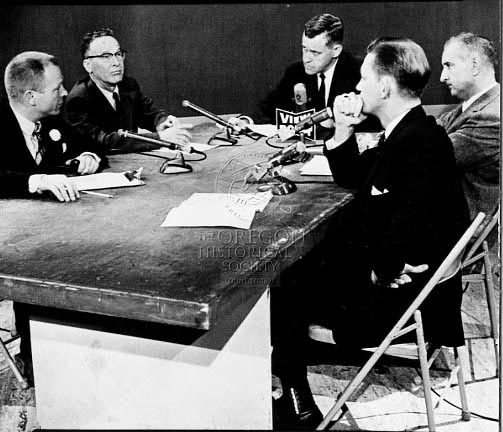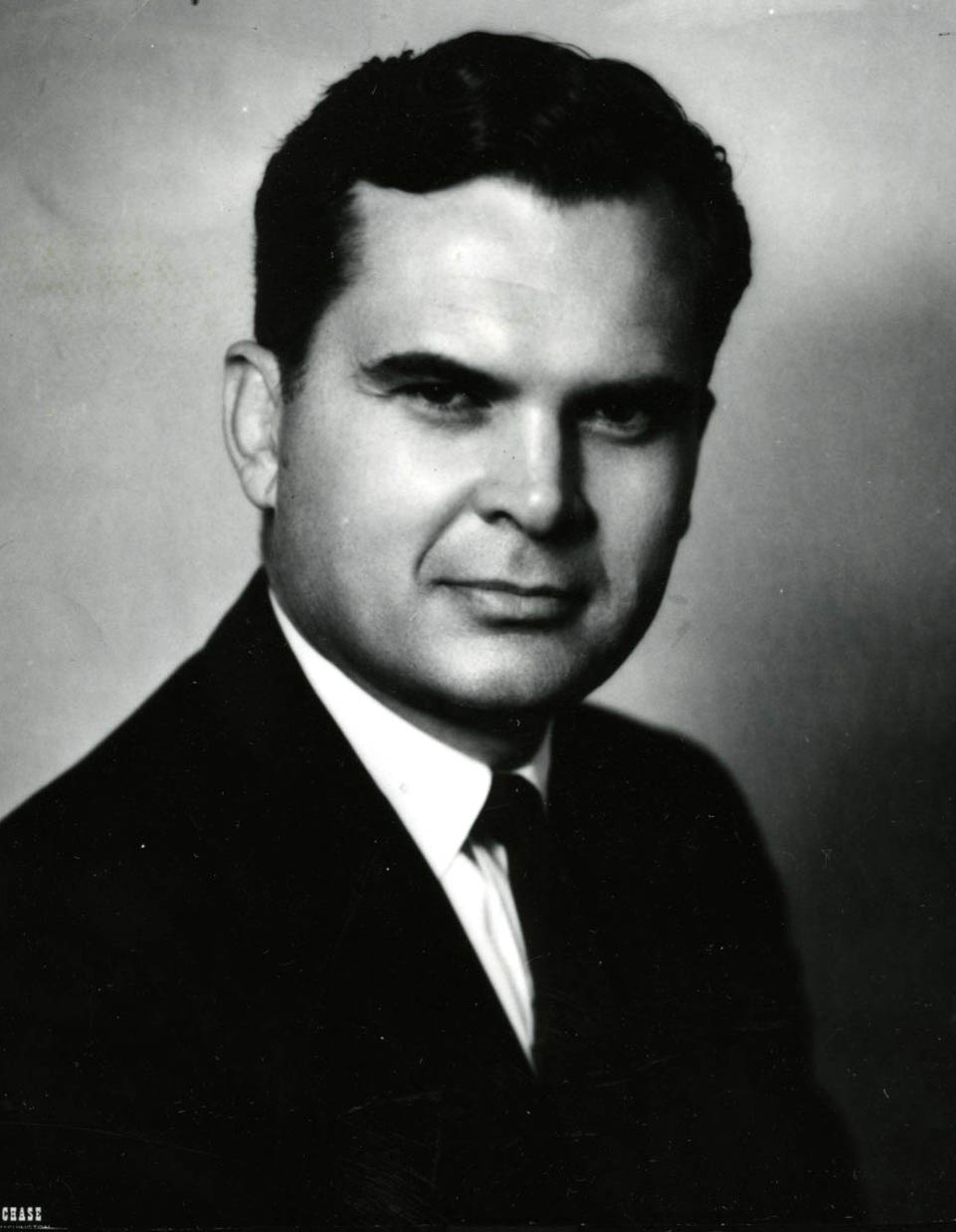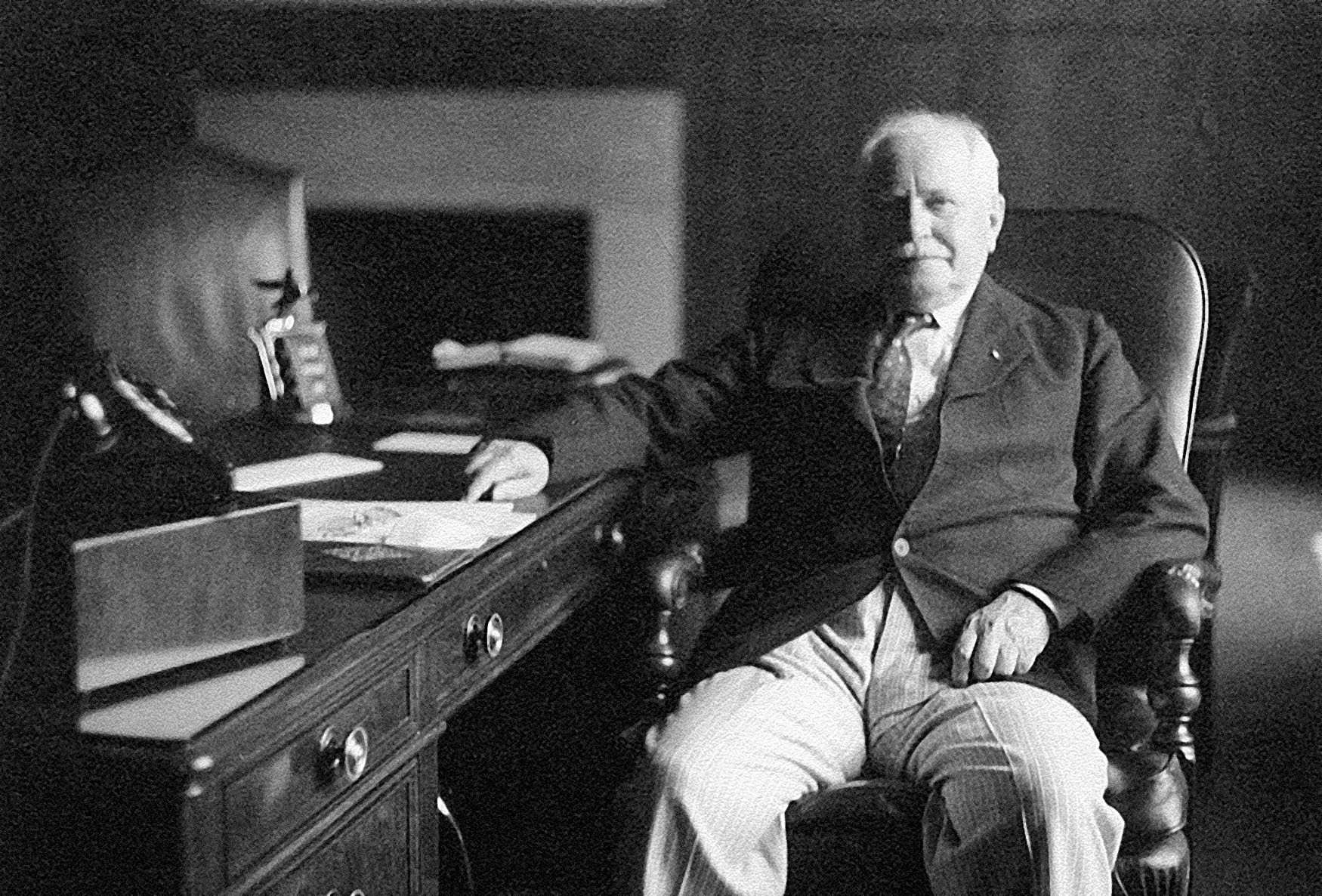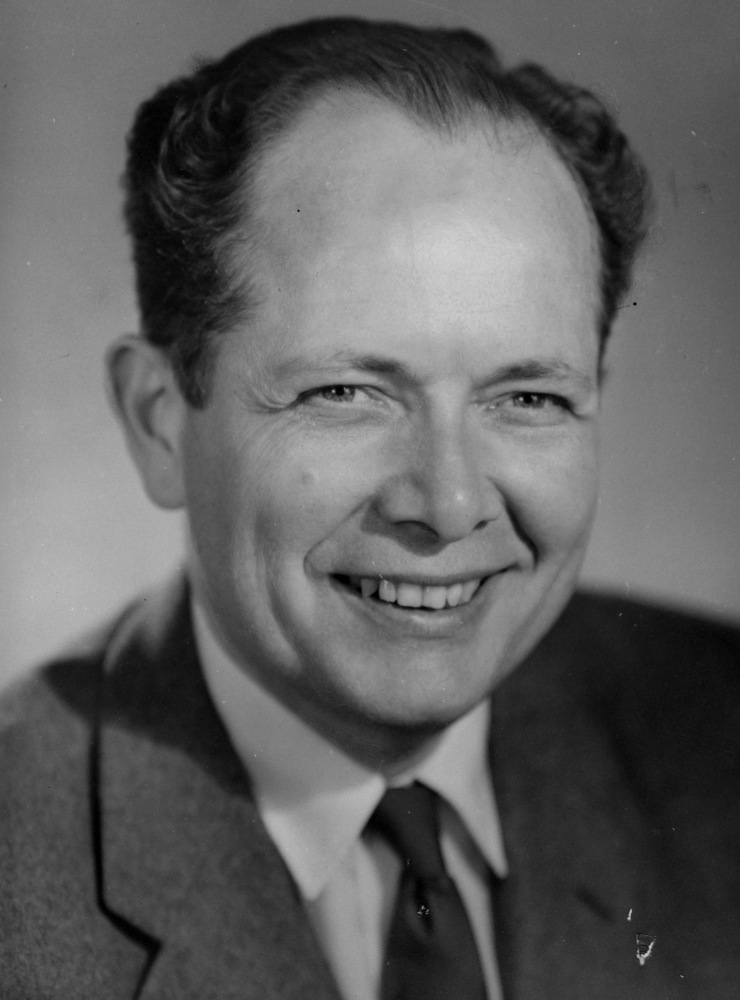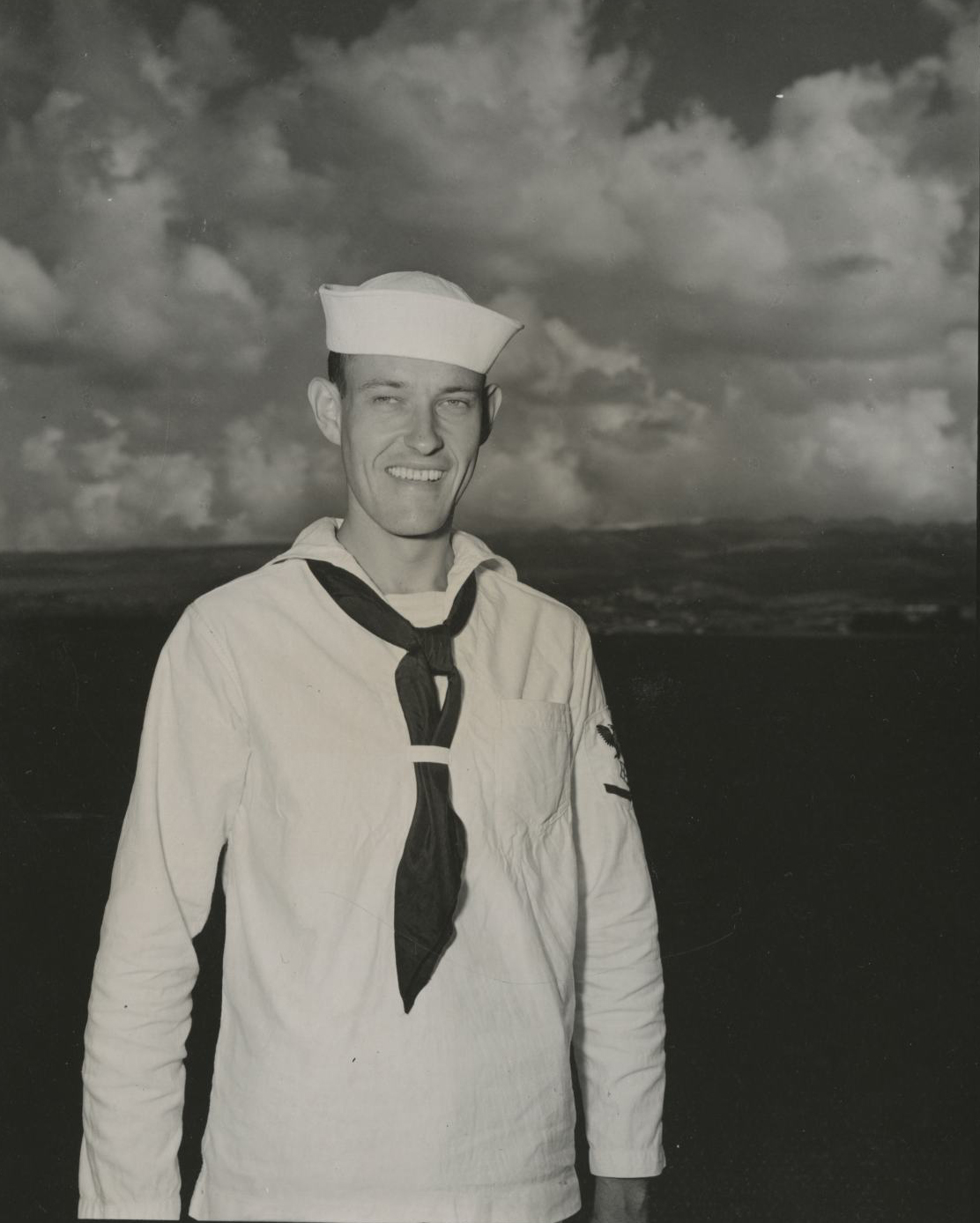Harry Boivin, a legislator from Klamath County, rose to prominence during the late 1930s when, at age thirty-three, he became the youngest Speaker of the Oregon House of Representatives. Known as an effective negotiator and canny strategist, Boivin earned the nickname “The Fox” early in his career. That sobriquet stayed with him through his eighteen years as state senator. Boivin began his political career as a moderate Democrat and was a staunch defender of eastern Oregon interests, often allying with Republican legislators from eastern Oregon and the Rogue River Valley. He was a coalition-building “contrarian” Democrat at a time when Oregon’s Democratic Party was replacing its conservative leadership with liberals from Portland and Eugene.
Harry Dolan Boivin was born in 1904 in Ashland to working-class immigrant parents, his father having emigrated from France and his mother from Ireland. The family soon moved to Klamath Falls, where he would live for most of his life. He earned a B.A. and law degree from Santa Clara University in California and returned to Klamath Falls in 1923, where he became a junior partner in the law firm of Claude McCulloch, a prominent Democrat who was Boivin’s mentor. Boivin ran for Klamath County district attorney in 1926 as a Democrat, losing by only 57 votes in a county where Republican voters outnumbered Democrats three to one.
During the Great Depression and President Franklin Roosevelt’s New Deal, a sizable number of Klamath County residents, like many other Oregonians, switched their votes from the Republican to the Democratic Party. Boivin won election as a representative from the state’s Thirty-Second District in 1934, and three years later his skills and friendly manner earned him the House speakership. During his first years in Salem, Boivin supported New Deal programs such as the Civilian Conservation Corps and publicly owned power. With a sizable number of union members in Klamath Falls sawmills, labor unions considered him a friend, but Boivin gradually became more conservative, distancing himself from the liberal wing of the Oregon Democratic Party. Those differences widened after Boivin was elected to the Oregon State Senate in 1954.
During his tenure in the House, Boivin enjoyed good relations with Charles Martin, Oregon’s anti-New Deal Democratic governor. He detested Second District Congressman Walter Pierce, whom he referred to as Weeping Walter for his allegedly insincere emotional displays. At age thirty-nine, Boivin left his House seat to seek a commission in the armed forces. He was denied for physical reasons and instead worked at the U.S Attorney’s office in Portland for most of World War II. During the late 1940s, he served on state boards while maintaining his one-person law practice in Klamath Falls.
Boivin defeated Lake County rancher Oscar Kittredge, a Republican, for the Oregon Senate in 1954. In 1955, reacting to claims from the Daughters of the American Revolution that Oregon schools were using “unpatriotic” textbooks, Boivin joined Republicans in an unsuccessful effort to create an Oregon Un-American Activities Committee. Fellow Republican legislator Mark O. Hatfield derided the measure as “the latest in a series of investigative hysterias.” By 1960, Boivin was favoring reforms that labor leaders considered to be anti-union.
Boivin’s primary goal in the legislature was to protect the interests of Klamath County and eastern Oregon. He formed an effective coalition with Republican legislators east of the Cascades to serve the region, which included establishing the Oregon Institute of Technology in Klamath Falls in 1948 and placing it under the State Board of Higher Education in 1960. Boivin had developed a friendship with Tom McCall, who served briefly on Governor Douglas McKay's staff, a relationship that was instrumental in the transfer of the Oregon Air National Guard’s training facility from Portland to Klamath Falls’ Kingsley Field.
With support from Republican senators, Boivin was elected president of the Oregon Senate in 1961–1963 and 1965–1967. When he appointed Republicans to chair important committees, Democrats such as Monroe Sweetland, Richard Neuberger, Charles Porter, and Robert Straub accused him of being “disloyal” to the party. He remarked that people like Sweetland, who conservatives considered too liberal, “scared” him and other rural legislators. In 1990, Boivin recalled joking with Medford Democrat James Redden about being “just a Po’ Democrat from Poe Valley,” a small town east of Klamath Falls. Redden retorted, “You’re a Po’ Democrat, that’s for sure.”
During the 1960s, both Republicans and Democrats urged Boivin to switch parties, which he declined to do. Preferring to remain a "citizen legislator" in Salem, he also refused entreaties from Republicans to run for Congress against the sitting Democrat, Al Ullman. Boivin retired from the senate in 1972 and maintained his Klamath Falls law practice for some years. A few years after the death of his wife Vivian in 1985, he moved to Medford.
Harry Boivin died in March 1999. Later that year, the Oregon Institute of Technology named Boivin Hall in his honor.
-
![]()
Harry Boivin, 1965.
Courtesy Oregon Hist. Society Research Lib., 000827
-
![]()
Harry Boivin, 1949.
Courtesy Oregon Hist. Society Research Lib., 000826
-
![]()
Former State House Speakers: Boivin (back left), McAllistair, Hall, Steelhammer, Wilhelm, Geary, Harris, Carkin, Lonergan, and Latourette, 1955.
Courtesy Oregon Hist. Society Research Lib., 001086
-
![]()
Harry Boivin, third from right, attends Hatfield's signing of OSC's name change to Oregon State University, 1961.
Courtesy Oregon State University Libraries
-
![Other guests were Robert Duncan, Anthony Yturri, and F.F. Montgomery]()
Boivin, second from left, on Tom McCall's KGW-TV show, Viewpoint, 1961.
Other guests were Robert Duncan, Anthony Yturri, and F.F. Montgomery Courtesy Oregon Hist. Society Research Lib., Oregon Journal, 012491
-
![]()
Harry Boivin (right) with oral historian Clark Hansen, and an unidentified woman, 1992.
Courtesy Oregon HIst. Society Research Lib., SR1107
-
![]()
Harry Bovin (left) and Debbs Potts, 1992.
Courtesy Oregon HIst. Society Research Lib., SR1107
Related Entries
-
![Albert Conrad "Al" Ullman (1914-1986)]()
Albert Conrad "Al" Ullman (1914-1986)
Albert Conrad "Al" Ullman, the U.S. representative from Oregon’s Second…
-
![Charles Martin (1863-1946)]()
Charles Martin (1863-1946)
By early May 1938, as his reelection bid faltered in the primary, Charl…
-
![Monroe Sweetland (1910-2006)]()
Monroe Sweetland (1910-2006)
Monroe Sweetland's life embraced the cultural revolution of the 1920s, …
-
![Thomas William Lawson McCall (1913-1983)]()
Thomas William Lawson McCall (1913-1983)
Tom McCall, more than any leader of his era, shaped the identity of mod…
-
![Walter Pierce (1861-1954)]()
Walter Pierce (1861-1954)
Walter Pierce's long public career extended from the 1890s to the polit…
Related Historical Records
Map This on the Oregon History WayFinder
The Oregon History Wayfinder is an interactive map that identifies significant places, people, and events in Oregon history.
Further Reading
Boivin, Harry D., interviewed by Clark Hansen, July 25, 1990, and June 6, 1992. SR1107. Oregon Historical Society Research Library, Portland.
Harry D. Boivin Papers. Shaw Historical Library, Oregon Institute of Technology, Klamath Falls.
Burton, Robert E. Democrats of Oregon: The Pattern of Minority Politics, 1900-1956. Eugene: University of Oregon, 1970.
Sadler, Russell. “The Fox leaves big political legacy.” Eugene Register-Guard, March 21, 1999.





